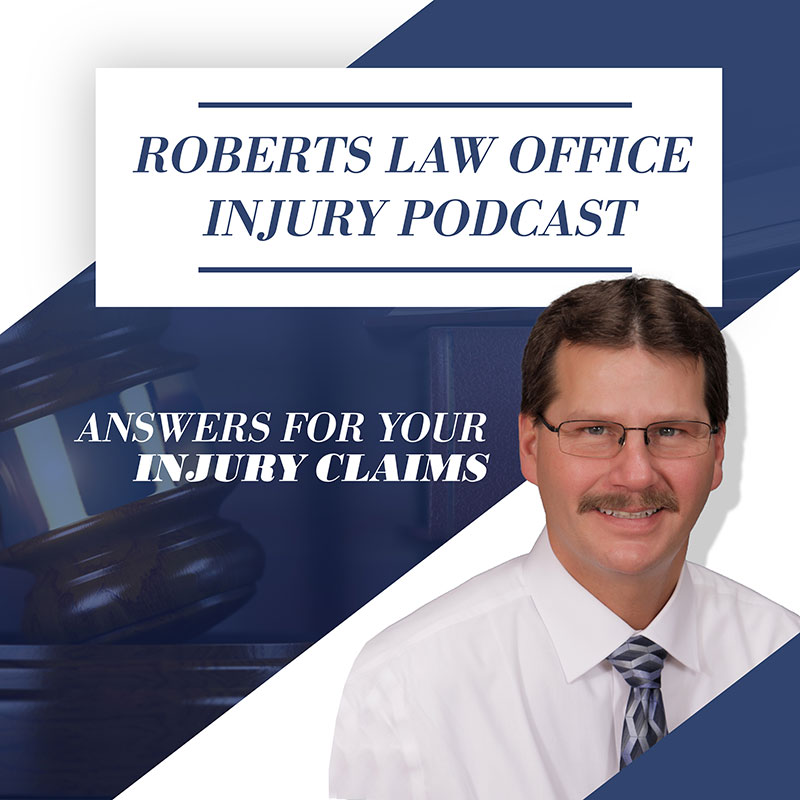Episode 60: Calloway County attorney Jeff Roberts explains what happens to your workers’ comp benefits if you lose your job or change jobs. There’s also the risk that your company goes out of business. Regardless, will you still be able to get your workers’ compensation benefits? Let’s listen to Jeff explain how the law works.
Your Rights Are Protected
Jeff begins by clarifying that you cannot be retaliated against, including getting fired, because you spoke to a workers’ comp attorney or filed a claim. If you suffered a work-related injury, your rights are protected by Kentucky law. The company can be severely penalized if it’s proven that it took steps to retaliate against an employee because they sought legal advice or filed a workers’ comp claim.
Jeff explains, it’s still possible that you can be fired for another reason, such as violating a company policy, such as something related to sick time or not returning to work after the doctor has cleared you to return.

Scenario #1: Termination by Retaliation
Assuming you were terminated based on retaliation by your employer, you should still be able to receive your benefits, and you may also have a claim against the employer for retaliatory discharge.
Again, if you were terminated due to a company policy violation, not retaliation, it does not impact your ability to receive benefits, but the circumstances could impact the amount of your benefits received as part of your claim.
Jeff explains that if you’re off work, based on your doctor’s orders, the attendance policy should not apply. You’re following your doctor’s orders. If you were subject to disciplinary measures before-hand, get injured and then are off work due to the injury, you may still be terminated at some point. During your time off work, because of the injury, you should be able to receive temporary total disability benefits (TTD) during the medically-related time off.
Scenario #2: Termination due to Misconduct
If you’re terminated because of misconduct on your part, your benefits can be affected. You’d still be eligible for the TTD payments and they must cover your medical expenses related to the treatment for the workplace injury. However, your permanent partial disability benefits can be impacted.
The judge will decide if you are physically able to return to the same job, after you’re cleared to return to work. He/she will also decide if you are able to earn the same or greater wage. If you cannot return or earn the same or greater wage, but were terminated because of your misconduct, the increase in workers’ comp benefits you could have received can be withheld.
The potential increase is not withheld if your termination was not directly related to your misconduct.
If your injury is going to prevent you from going back to the same type of work, you still have rights to workers’ compensation benefits. For instance, if you’re in construction and your low-back injury will prevent you from heavy lifting, you may not be able to perform your work duties. If your employer may be able to fire you, unless an Americans with Disabilities Act claim (ADA) can be asserted or if your union contract has specific provisions related to how this is to be handled.
In the above example, if your employer lets you go because you can no longer perform the work duties, it would not impact your temporary total disability (TTD) during the time you’re off work on doctor’s orders, you’d still be entitled to have your medical expense related to the injury covered and the permanent partial disability benefit (including the enhancement) could also be awarded. You may also be entitled to permanent total disability, if the injury is severe enough.
Should I Hire a Workers’ Compensation Attorney?
Jeff explains that the insurance company handling your workers’ comp claim has attorneys working with them. The insurance company is focused on paying out a little as possible for your claim. They are not on your side.
Because of the above, you might be better off seeking the advice of a workers’ compensation attorney and ultimately hiring him/her to represent you and your claim. You should understand the rights you have and the benefits you are entitled to, according to the law. An attorney will be able to walk you through all of this.
Jeff knows the law and has been practicing workers’ compensation law for over 30 years. This experience helps him to effectively deal with the games the insurance company will try to play. You can always try this on your own, but if you have a significant injury, you’re probably going to need an attorney. It’s your decision. At the Roberts Law Office, your initial consultation for an injury is free.
Jeff handles cases on a contingency fee basis, which means there are no up-front fees to hire him. He only gets paid at the end of the case. Normally, case expenses and fees are deducted from the settlement (at the end of the case), but if Jeff were unsuccessful in winning your case, those expenses and fees are not billed to the client. In Episode 56, Jeff explains how a contingency fee works. Jeff’s office phone number is (270) 753-0053.
Scenario #3: You Decide to Take a Different Job
After your work-related injury, you may decide to look for a different job, while you’re off work. Would this affect your workers’ comp benefits? Jeff notes this is a situation he’s encountered fairly frequently. It’s also a situation in which you may need to involve your attorney.
Depending upon the extent of your injury, you might not be able to perform the same job duties. Again, consider the previous example of a construction worker who suffers a low-back injury. It may be a good time to begin thinking about taking a different job. Could you take a supervisor position in a different company, based on your experience? It would be less physically demanding.
Jeff explains that if you take a “better” job, it doesn’t affect your workers’ compensation case. Your TTD benefits will continue until the doctor says you can return to work or at maximum medical improvement (MMI), either at your original company or at the new company. Your medical bills related to the injury will still be covered. Permanent disability benefits might be impacted, but if you’re earning a higher wage in the new position, it might be more that the benefit increase.
Jeff typically tells clients they are better off physically, mentally and financially if they can return to work. In his opinion, the judge may actually like the fact that you’re doing something to better yourself.
If you do decide to change jobs, Jeff explains that under most cases involving a permanent injury, Kentucky law provides that medical benefits can continue for a minimum of 15 years. This is regardless of whether you return to the original company or a different company. As long as the medical treatment benefit is related to your workplace injury, you should be okay.
Scenario #4: My Company Goes Out of Business (or Files Bankruptcy)
If you’re receiving workers’ compensation benefits and your company either goes out of business of files bankruptcy, it can be a scary situation. In most cases, it won’t have any effect on your Kentucky worker’s compensation benefits.
Jeff explains that your employer’s workers’ comp insurance carrier is the one that’s actually responsible for paying your benefits. People often forget it’s not the company they work for that’s paying.
If your company is “self-insured” meaning they don’t have an outside worker’s compensation insurance company, they are required by law to have funds already set aside to handle workers’ comp benefits and other liabilities. The Kentucky Department of Workers’ Claims monitors those funds. Again, this shouldn’t affect your ability to receive your benefits.
If the self-insured funds somehow ran out, other Kentucky state departments provide a safety net to injured workers and their families.
If the workers’ compensation insurance carrier were to go out of business, the workers’ comp benefits would then be paid via the Kentucky Insurance Guarantee Association.
Scenario #5: Your Company Is Purchased by another Company
If the company you work for gets bought out by a new company, you’ll continue to receive your benefits. The purchase will not impact your benefits.
You have a series of safety nets that are there to make sure you’re able to continue receiving your Kentucky workers’ compensation benefits and medical treatment.
Recognized Experience Throughout Kentucky
We wrap up the episode discussing how Jeff is often contacted by other attorneys across the state for answers to their Kentucky workers’ comp questions. He’s regularly asked by other attorneys to handle workers’ comp claims for either their clients or family members of the attorneys. In fact, the majority of claims Jeff handles come from referrals from past clients and/or other attorneys.
Jeff Roberts Represents Injured Clients Throughout Kentucky
With offices located in Calloway County and now Christian County, Jeff has a history of representing personal injury clients, workers’ compensation clients and social security disability clients across the state. He’s represented clients from Paducah, Bowling Green, Louisville, Covington, Whitesville and many other Kentucky locations. He’s not just a Western Kentucky injury attorney.
We hope you found this episode insightful and helpful. Thank you for listening!
Is It Time to Speak with an Attorney about your Workers’ Compensation Claim?
The office phone number is (270) 753-0053 or toll free at 800-844-5108. For more information, visit www.JeffRobertsLaw.com. This podcast is meant to provide information and is not legal advice. Jeff’s principal office is located at 509 Main Street, Murray, Kentucky. Co-host Jim Ray is a non-attorney spokesperson. This is an advertisement.




